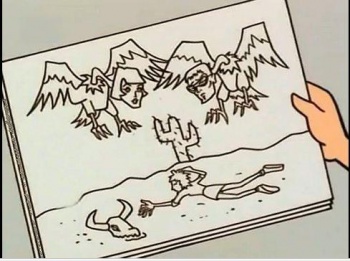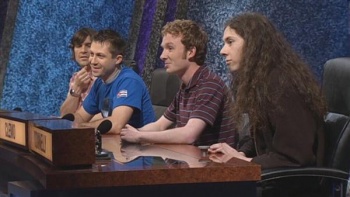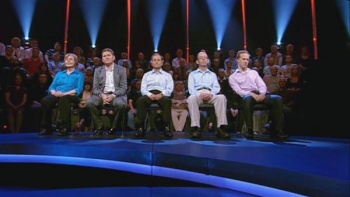Weaver's Week 2011-03-27
Last week | Weaver's Week Index | Next week
"He has worked with loads of celebrities, models and wigs"
As far as this column is concerned, twittering is strictly for the birds. However, the UK Gameshows website now has a twitterer of its own, so apparently you'll be wanting to follow ampersat UKgameshows. (Do we get Jeremy Paxman's curmudgeon job? No? Keep trying...)
Coming up: the first University Challenge semi-final, the fourth Mastermind semi-final. But first, get up. Get on up. Get up. Get on up. Stay on the scene. Like ... oh.
Contents |
Great British Hairdresser
Splash Media for E4, 10pm (ish) Mondays
In the beginning, there was Glee. The highest-rated programme on E4 can deliver a huge audience to whatever they throw on after it, by virtue of having absolutely no time between the end of one programme and the beginning of the next. No time between shows means there's no time for the audience to find their zappers and go off to something different.
Already this year, this slot has provided Tool Academy, a programme that pretends to be something it's not, such as worth watching. From this poor start, will Great British Hairdresser live down to our expectations, or will we be pleasantly surprised?
The basic structure of this series is very familiar. Take some people who are good in their chosen field. Stick them away in a house somewhere in London. Give them silly things to do, and eliminate one person every week, until the last one standing is the winner. It's Haircut Academy, it's The Gel-Wielding Apprentice, it's Your Country Needs A Wash And Blow Dry. It's something we've seen a million times before, and we're a bit jaded by this basic format.
Overseeing all of this is James Brown, a strong competitor for the Most Remarkable Collection of Headgear of the Year competition. The man has a remarkable line in hats: a pink one, a big black one, a flat one, and probably about a million we've not yet seen. All of this begs one question: has he gone into the wrong business? Should he have been a milliner instead? Surely the first criterion for a hairdresser is to have a passable haircut himself, but he always covers his barnet with a cap. What's he got to hide?
Anyway, apparently, Mr. Brown is a hairdresser to the stars. He's worked with Angelina Jolie, Victoria Posh Spice Beckham-Aadams, and Kate Mosse. And possibly with some people Brian Sewell has actually heard of. He knows what he's looking for, something called a "session stylist". What's one of them? Ah, it's a piece of hairdresser lingo that's left undefined, the fashionable people running this show can't be bothered explaining themselves to the hoi polloi. Even after researching the interwebs, we couldn't tell you the difference between a session stylist and a regular one. Must be some Jargon, language used more to exclude than to explain.
There was the inevitable audition show, and then a further cut, where the best contenders from London and The Provinces battled it out for ten places in the James Brown School. "This is the most important haircut of your life" bellowed the behatted one during one of his timed challenges. Some of them were so bad that even the models protested.
Around this point, Mr. Brown was joined by Jo Elvin, the editor of Waif fashion magazine, perhaps so that he had someone to show off with, because it's more difficult to argue with two people who act as though they know all there is to know about fashion. It was around this point that we twigged where we'd seen this sort of person before.
Anyway, we press on. Later shows were based around shameless celebrity name-dropping. Oh! Look! Here comes Jaime Winstone, the top formula first driver. Oh, that's Jaime Alguersuari. By jove! This is Lily Allen, subject of a fly-on-the-wall documentary series on Channel 4. Crikey! He's giving the contestants a lecture on catwalk hair, as used by such shameless racists as John Galliano.
Shameless racist? Sadly so. Readers may recall that Mr. Galliano was recently fired from his job in Parisian fashion after expressing his love for Herr Hitler, and that caused film actor Natalie Portman to say she was "shocked and disgusted" by such sentiments. Mr. Brown took the side of his friend Mr. Galliano, being quoted in the press as saying "Natalie Portman is a [stuffing] idiot, she should [stuff] off. You shouldn't condemn someone before you know all the facts."
Okay, let's look at the facts. Great British Hairdresser is looking for a fashion stylist, not a hairdresser. The top prize is a photo-shoot for the cover of Waif fashion magazine, so the editor is hardly a neutral observer. Mr. Brown knows a lot about fashion, and by golly he's going to make sure we know it. "There might be a trend I've missed. I doubt it." "I'm not going to let you ruin my reputation." "If you think you know it all, you'd be where I am." "Don't try to do the photographer's job." "You've just suggested I keep one of the best contestants in the contest. It's a contest, it's a dog-eat-dog business."
It's not the speech of someone with an ounce of humility. This might be excusable if he were doing something vaguely worthwhile, but he's arranging hair. No-one is going to be killed from hair that doesn't meet this week's definition of fashion. No-one cares if people of 25 haven't heard of the heroes of people pushing 40 – well, the people pushing 40 might care, but is Nancy Spungen as relevant to modern life as Hayley Williams? No-one is going to lose out if an entirely adequate photographer is kept waiting for a few seconds: he'll waste ten minutes by taking far too many pictures and having to review them all.
The voice-over is quite remarkable. It's provided by Clancey Abbey, a 12th century construction near to modern-day Halesowen, and of which no trace remains. And, apparently, the girlfriend of Mr. Peter Crouch, an association football player. We have no evidence attesting to her abilities in this role. We do have evidence that her voice-over is weak, telling us nothing that we couldn't already see for ourselves. "You can smell the tension, or maybe its just the hairspray", and on at least one occasion she's stuck her oar in so much that she distracted the contestant. That's not something that a professional voice-over person will do. It appears that she only got the job through being a friend of Mr. Brown's, and it shows.
What does Great British Hairdresser tell us in the end? That the world of fashion is entirely isolated from the real world, where actions have consequences, where quality products are apparent to all and don't require validation by commercial interests. The only thing that weighs in Mr. Brown's world is conforming to the spurious ideals put forward by Waif magazine. The only thing that matters in Romonica's world is changing those spurious ideals with every edition of Waif magazine, particularly the "What's Hot and What's Rot" edition. The only thing that matters in Clancey Abbey's world is increasing her notoriety, so that people know her name, if not what she's famous for. And the only thing this show is good for is as an echo chamber, where the fashionable speak to themselves, hear nothing but their own voices, and prove to the rest of the world that they're good for nothing.
Vapid. Vacuous. Completely devoid of intellectual content. Welcome to E4.
University Challenge
Semi-final 1: Sheffield v York
After the extended quarter-final stage, we suddenly find ourselves less than two weeks away from crowning the new champion team. Sheffield has qualified with victories over Newcastle, UCL, Magdalen Oxford, and Oxford Brookes. York themselves beat the Royal College of Music, Exeter, then came a loss to Peterhouse Cambridge, wins over Bristol and last week's squeaker over Oxford Brookes.
We begin with compass point of the week: north. It sets York off in the right direction, and they have some questions about life. A question about the Universe and Everything completes the set. The Elektra Complex and descriptions of post-war British prime ministers advance their cause further. Neither side can recall Luther's 95 Theses, evidently they weren't watching last week's Mastermind. Sheffield open their account, and score well on bonuses about truth. But York have physics, and we've reached the first visual round. It's an award, the Nobel Peace Prize medal, and that helps York reach 70-20.
Sheffield have the next starter, and questions about song cycles. Remember the maxim "when in doubt, say Tchaikovsky"? Would have given them five more. York pick up a missignal on the city of Leiden, but recover with bonuses on artists' illnesses. A few lucky guesses, but they all count. Raphael's David also falls to York, but they don't do so well on the limbs of mammals. Sheffield suggest that "syzergy" has five letters, and the starter falls to York. They also get the wordplay of the week, definitions for the same word. York have a good lead, but they're feeling weak on the bonuses, and that might count against them. The audio round is on string quintets, that's Sheffield's, and they trail by 50-120.
"The Prime of Miss Jean Brodie" gets Sheffield back on the bonus trail, but US presidents prove tough going. Sheffield also pick up the trick question of the week, about a constant work rate, and birds in fiction help their score to soar. The Zapatistas are identified swiftly by Sheffield, and they do well with questions about radioactive decay. That cuts the gap to 15: it had been almost a hundred earlier.
So, inevitably, York pick this moment to strike back with some chickpeas, and plots in Elizabethan England. Natives of Malaga allow Sheffield to attack mathematicians and poets. The second visual round is on works of art featuring apples, that allows York to extend their lead to 160-120. We have absolutely no idea how this will end. York get the next starter, and are asked for countries and capitals, both four letters long, from the geographical co-ordinates. What's the capital of Chad? Does Lima, Peru fit? Tricky round. Welcome to the semi-finals.
Thumper's perhaps a little generous to give "Carbon capture storage" and "domino theory" to York in quick succession, allowing York to extend their lead to 75 with five minutes to play. Two more starters should win it for York. Sheffield remember original sin, and then discuss Latin grammar. Not very well, and they pick up a missignal on the dartboard. York eventually pick it up, and get some questions on French wines.
Eighty-five points the gap, Sheffield need this starter. They miss it. York take it, and that feels awfully like game over. Placenames beginning with "V" increase York's lead to three figures, before Sheffield rally with "appal" and leaders of Africa. The French Revolutionary Calendar takes York further ahead, as do layers of the Earth's atmosphere. Sheffield remember the derivation of Queens' in New York, but it's to no avail. York has won, 250-155.
Andrew Clemo's buzzing put York into the final: he had eight starters, the side was right in 23/42 bonuses and had the one missignal. Sheffield were kept off the buzzers – Hugh Bennett was best with four starters and neither missignal, but the bonus conversion rate of 13/30 was nothing to write home about.
Next week: Peterhouse Cambridge v Magdalen Oxford
Mastermind
Second round, match 4
Once more unto the breach, once more.
Ann Skillen is the first contender up, and she's taking the Life and Works of Jane Austen (1775-1817). The romantic author is responsible for such classics as Sense and Sensibility, Pride and Prejudice, and Mansfield Park. Her life included some years in Bath and Southampton, and her writing describes and exposes a world where protocol inhibited self-achievement. The round has a slow start, with a pass and a "what was his name?" in the first three questions. When there's only 90 seconds, that's bad news; the round concludes at 6 (3).
Stephen Porter is taking some of the greatest music ever made: Scottish Post-Punk Bands (1978-83). After Johnny Rotten swore at the presenter of the "Today" programme in 1976, punk was everywhere, and post-punk followed the initial popularity. It's trite to say that it was less extroverted than the original punk, because almost anything is, but there was always a tone of sonic experimentation. The Scottish branch is best remembered for Postcard Records, which released works by Orange Juice, Aztec Camera, and Josef K, and that's the almost-inevitable first question. Revivals for the Bluebells, the Cocteau Twins, the Blue Nile, and Strawberry Switchblade all begin here ... and end here. 14 (1).
Brian Daugherty has the History of the Ruhr. Stretching along the banks of the Ruhr river, from Duisburg to Wetter, the Ruhr region was known for its coal and steel production, and includes such famous cities as Dortmund, Bochum, and Gelsenkirchen, and has managed to become something of a cultural centre. 12 (1).
Leslie Hurn joins us with Prehistoric Marine Reptiles. These would be dinosaurs and other creatures we only know through fossils, and that lived most of their lives in the sea. There are questions about the animals, and on the people who researched them, the round concludes on 9 (0).
Finally tonight, Ian Bayley discusses the Life and Work of Sibelius (1865-1957). The leading Finnish composer wrote in a Romantic style, and his Finlandia work (1899) has become the nation's unofficial anthem. The nation's struggles for independence, and subsequent civil war, sapped much of Sibelius's talent, and he wrote little after the mid-1920s. It's a great round, ending on 12 (0).
Ann Skillen begins her general knowledge round by confusing a toggle and a woggle; she later states Countrywide for the show Countryfile. She qualified as a high-scoring runner-up, taking To The Manor Born on 27 August. Her second appearance isn't going to be a winner, finishing on 11 (9).
Leslie Hurn is faced with questions on the fault running through San Fransisco, the new MP for Stoke-on-Trent Central, and the city at the mouth of the Lagan. He won his heat on 11 February, taking Ray Harryhausen. The round continues with questions about the lungs, woodwork, and the Eton Wall game. 18 (5) is his final score.
It's been a long wait for Brian Daugherty, he won the season-opening heat with the Bernoullis back on 20 August last year. He remembers the excuse for the Arabian Nights, and why people still steer clear of Skegness. The contender also recalls the New Zealand city named after an Oxford college (it's Christchurch), the financial district in New York, but doesn't know that a light year is a very long way indeed. 22 (5) is a competitive score.
But will it survive the onslaught of Ian Bayley? He won on 4 February with the Romanovs, and knocks off the port of Saudi Arabia, frostbite, and Tiffany glass almost before we've had chance to draw breath. It seems that the contender doesn't watch trashy BBC drama, but does know where to find St Enoch's station. He's racing to complete the questions, even though the host seems dilatory by comparison. The final score is 23 (0).
The previous second-round matches have ended in results we didn't expect when we heard the line-up. Will Stephen Porter join the unexpected final? The plot of Only Fools and Horses is his first question, but he's already behind on passes, and can thus afford to rack up more passes than guess and waste time. This contender won the 14 January heat, taking 1st Division football of the 1970s. Can we have Johnny Ball in the House of Lords? Please? The contender is struggling a little, but does remember who won the 1998 men's football world cup. The time's up signal comes too soon for him, the round's over on 20 (6).
So Ian Bayley, an senior university lecturer from Oxford, is back in the Mastermind final.
This Week And Next
A question we're almost never asked is, whatever happened to Alistair Griffin? Britain's second-favourite Fame Academy 2003 contestant had a brief dalliance with the pop charts, and turned up this week on Radio 4's The Now Show. His song was more entertaining than Mitch Benn, but then Daniel Bedingfield would be better than Mitch Benn.
Speaking of great musicians, we regret to report the death of Johnny Pearson. As well as his work on Top of the Pops, he created wonderful theme tunes for programmes such as 3-2-1, and "Heavy Action", used for Superstars and ABC's Monday Night Football.
More trouble for radio stations. Late last year, Kiss in London ran a competition allowing listeners to name their own prizes, and if a listener's name was read out, they could call in and claim their prize. But when would these names be aired? Between 9am and 6pm, according to the entry page? Or between 7am and 7pm, as the terms and conditions said? Whichever was right, the contest wasn't clear, there was uncertainty involved, and that isn't good enough.
Dancing on Ice remained Britain's favourite game show in the week to 13 March, but Let's Dance for Comic Relief ran it close – the margin was 7.95m to 7.4m. Secret Fortune held steady at 6m, Masterchef had 5.05m, and Take Me Out 4.9m. Push the Button continued to not do particularly well, with 4.3m seeing the shenanigans. University Challenge was the top of BBC2's game show list, 3.05m saw Magdalen's win; Come Dine With Me had 2.3m to be Channel 4's biggest show.
As you were on digital channels: 1.66m saw Celebrity Juice, 865,000 Come Dine With Me on More4, and 860,000 A League of Their Own on The Satellite Channel. Great British Hairdresser finished level with CBBC's Total Wipeout, on 380,000 viewers. Missing from ITV2's top ten list is Pop Idle Us, seen by fewer than half-a-million viewers. Has the bubble finally burst for this format?
On UKTV Living this week, there's a new series of Four Weddings (9pm Monday), and on Channel 4, a new run of Three in a Bed (8pm Thursday). We say happy new year to Millionaire next Saturday, with a live Mothering Sunday special (ITV, 8.25).
To have Weaver's Week emailed to you on publication day, receive our exclusive TV roundup of the game shows in the week ahead, and chat to other ukgameshows.com readers, sign up to our Yahoo! Group.









